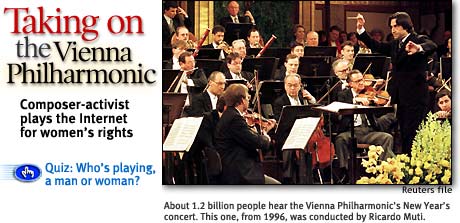Eight years ago, the all-male Vienna Philharmonic agreed to open its doors to women for the first time since it was founded, in 1842. Has it lived up to that agreement? In a word, no. These guys are still playing with themselves. Despite official promises and pronouncements, and the brief hiring of a female harpist who departed long ago, the orchestra remains as obdurate as ever.
 William Osborne contended in “Art Is Just an Excuse,” the first of his many scholarly Web-posted essays about gender bias, cultural isomorphism and other issues in classical music, that the Vienna Philharmonic’s exclusionary policy was part of an intolerable racist heritage. He argued that the orchestra’s stance, based on a belief in male supremacy and rooted in a historical rationale of national identity and cultural purity, cast such a pall over its considerable artistic achievement that the institution had turned out to be the shame, not the pride, of Western civilization.
William Osborne contended in “Art Is Just an Excuse,” the first of his many scholarly Web-posted essays about gender bias, cultural isomorphism and other issues in classical music, that the Vienna Philharmonic’s exclusionary policy was part of an intolerable racist heritage. He argued that the orchestra’s stance, based on a belief in male supremacy and rooted in a historical rationale of national identity and cultural purity, cast such a pall over its considerable artistic achievement that the institution had turned out to be the shame, not the pride, of Western civilization.
That was our summary of his argument almost six years ago in an article which traced how — through his essays and hundreds, perhaps thousands, of his emails — Osborne had instigated protests against the orchestra, forced it to reverse its exclusionary policy, and showed the Internet to be “a potent tool for bringing change even to the most hidebound of cultural institutions.”
Looking back now, we are forced to echo the Patrick Fitzgerald meme “a compelling story, if only it were true” — because Osborne has just sent this message:
On February 13, 2001, violist Ursula Plaichinger became the first non-harpist woman to win an audition for the Vienna State Opera. After a three-year tenure, members of the State Opera Orchestra become members of the Vienna Philharmonic. Ms. Plaichinger should have entered the Vienna Philharmonic 14 months ago, but she has still not been made a member. She would have been the first non-harpist woman to join the Vienna Philharmonic in its 163-year history.
There is an application procedure and vote necessary for entering the Philharmonic, but it is merely a formality. There has never been a documented case of a member of the State Opera Orchestra being denied membership in the Philharmonic after the tenure requirement is completed. It is also noteworthy that all of the men who have completed the tenure requirement and who entered the orchestra after Ms. Plaichinger, have been made members. She alone has been left out.
Very little information is available that might explain why Ms. Plaichinger has not been made a member. The Vienna Philharmonic offers one of the most prestigious and high-paying orchestra jobs in the world. It seems unlikely that Ms. Plaichinger would not have applied for membership unless something put her under extreme duress.
Two months ago Ms. Plaichinger took a leave of absence from the orchestra and is now living in Amsterdam. She occasionally returns to Vienna to play in various ensembles.
Given that she would have been the first non-harpist woman to enter the orchestra, the Austrian media should have long since inquired about what is going on, but there have been no reports. It is also a difficult story to research, because the members of the Vienna Philharmonic have been strictly forbidden to speak with the press — except by special permission and while they are monitored by the orchestra’s officials.
Even if many expected that this sort of thing would probably happen, it is still very troubling and saddening news.
Osborne informs us that Plaichinger has not returned his phone calls. We should also mention that the orchestra currently lists one woman, Charlotte Balzereit, as a full-fledged member. It lists a total of 135 players in the ensemble, including 13 members of the Vienna State Opera Orchestra who have yet to receive Philharmonic membership, Plaichinger among them. Balzereit is one of two harpists. (The other is a man.) She replaced the first woman harpist who gained full membership and then retired. In any case, there aren’t many male harpists for the orchestra to choose from and, besides, the harp is a peripheral instrument. It not only doesn’t appear often, it is not regarded by the orchestra as central to its testosterone “soul.”
— Tireless Staff of Thousands
Postscript: Osborne reports further that Ursula Wex, a cellist, will be coming up for membership in a year or so. Also, the Staatsoper says it hired two women violinists last winter. They would be starting in the fall and become eligible in 2009 — 12 years after the Philharmonic doors were opened. Ah, Vienna. So gemütlich.
PPS: See our follow-up item, IT TAKES A WOMAN, for more information.




